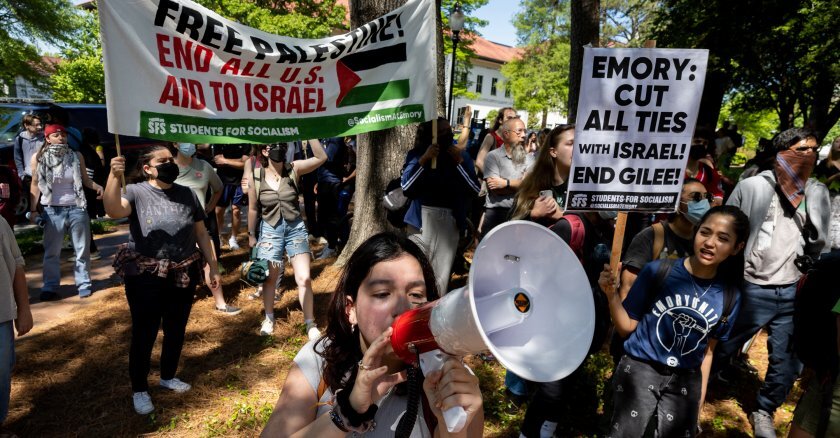We have experienced these kinds of widespread protests before, most notably during the fight for civil rights, during the protracted struggle to end the Vietnam War and, more recently, in the aftermath of the murder of George Floyd. We should have learned something from those protests. Now, the very fabric of our colleges and universities — one of our strongest bulwarks of democracy — is being threatened. Rather than mass-arresting protesters and militarizing our campuses, we need to take a different approach. In particular, college presidents need to step up.
More than 2,000 protesters on dozens of campuses have been arrested since mid-April. These numbers grow daily and include public flagship institutions such as Arizona State University, the University of Georgia, the University of Texas and the University of Wisconsin. They also encompass elite private institutions including Columbia University, Dartmouth College and Emory University, my alma mater, where a video of a female economics professor being body-slammed to the ground by police went viral.
My perspective on what is happening today is informed by having been a student protester, a college faculty member who lost a summer teaching contract because of my support for student protests, and a college president who had the responsibility to run a campus in an orderly manner and keep students and everyone else safe. I can’t image a scenario that would have caused me to view my students, who were mission-driven to question institutions and their activities, as trespassers or hoodlums.
College presidents aren’t the only ones who form skewed viewpoints of students who exercise their right to dissent, a principle they are taught to cherish in the academy. Public officials and other community leaders often look unfavorably on them as well. In 1978 at the college where I taught, I witnessed state troopers aggressively arresting and removing student protesters at a graduation ceremony being held at the church of an esteemed pastor and close confidante of Martin Luther King Jr. Although the pastor later criticized the use of force, at the time he refused to intercede to stop the beatings and arrests of protesters who were peacefully assembled and demanding, as required by a federal court ruling, an end to segregation of the state’s colleges and universities.
After living through this history, I am saddened because today I observe too many college presidents lacking the skill sets essential to leading their institutions through a crisis like the current one. That shouldn’t be surprising: In recruiting campus presidents, the boards of trustees and top administrators of systems of higher education have placed too much emphasis on candidates with backgrounds in fundraising and marketing and those who hold degrees from Ivy League schools. Those hiring bodies often overlook two important leadership qualities: problem solving and political acumen.
In times like these, colleges need presidents who will run into fires and not away from them. And while it is true that education leaders can’t stop the war in Gaza, they can stop the wars on their campuses if they communicate and engage effectively with students and uphold the sacred principle of academic freedom. This includes the right of students to question and criticize their institutions’ values as reflected in how they invest their endowment and pension funds.

One of my daughters, who teaches public school in Manhattan, witnessed fights breaking out on college campuses near her school between Jewish and Palestinian students calling each other terrorists and Zionists. She believes that the presence of senior administrators, led by campuses’ presidents, might have helped defuse some of the anger.
For college presidents, protecting academic freedom entails speaking in a manner that says to society that the academy is and always will be a marketplace of ideas and an unapologetic refuge for speech no matter how unpopular some of it may be. Martin Luther King Jr. once called riots “the language of the unheard.” While college presidents cannot condone riots, it is equally true that unless there exists an environment of openness, where students can be heard, they will find ways to express their ideas, and some of those ways may not be constructive.
I asked my daughter why she visited so many campuses where protests were occurring. She said her students were demanding to know what was really going on. “I want to be able to tell them from firsthand knowledge what I am seeing, feeling and what might be their destinies once they graduate from high school and step onto the hallowed grounds of their chosen universities,” she replied. To heal the divisions at our colleges today, their presidents must lead the way by leaving the comfort and protection of their offices and walking on those hallowed grounds among those brokenhearted, frightened, grieving — and yes, angry — students and other college family members.
Governing’s opinion columns reflect the views of their authors and not necessarily those of Governing’s editors or management.
Related Articles













